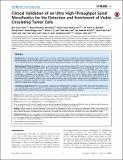Clinical Validation of an Ultra High-Throughput Spiral Microfluidics for the Detection and Enrichment of Viable Circulating Tumor Cells
Author(s)
Khoo, Bee Luan; Warkiani, Majid Ebrahimi; Tan, Daniel Shao-Weng; Bhagat, Ali Asgar S.; Irwin, Darryl; Lau, Dawn Pingxi; Lim, Alvin S. T.; Lim, Kiat Hon; Krisna, Sai Sakktee; Lim, Wan-Teck; Yap, Yoon Sim; Lee, Soo Chin; Soo, Ross A.; Han, Jongyoon; Lim, Chwee Teck; ... Show more Show less
DownloadKhoo-2014-Clinical Validation.pdf (1.039Mb)
PUBLISHER_CC
Publisher with Creative Commons License
Creative Commons Attribution
Terms of use
Metadata
Show full item recordAbstract
Background:
Circulating tumor cells (CTCs) are cancer cells that can be isolated via liquid biopsy from blood and can be phenotypically and genetically characterized to provide critical information for guiding cancer treatment. Current analysis of CTCs is hindered by the throughput, selectivity and specificity of devices or assays used in CTC detection and isolation.
Methodology/Principal Findings:
Here, we enriched and characterized putative CTCs from blood samples of patients with both advanced stage metastatic breast and lung cancers using a novel multiplexed spiral microfluidic chip. This system detected putative CTCs under high sensitivity (100%, n = 56) (Breast cancer samples: 12–1275 CTCs/ml; Lung cancer samples: 10–1535 CTCs/ml) rapidly from clinically relevant blood volumes (7.5 ml under 5 min). Blood samples were completely separated into plasma, CTCs and PBMCs components and each fraction were characterized with immunophenotyping (Pan-cytokeratin/CD45, CD44/CD24, EpCAM), fluorescence in-situ hybridization (FISH) (EML4-ALK) or targeted somatic mutation analysis. We used an ultra-sensitive mass spectrometry based system to highlight the presence of an EGFR-activating mutation in both isolated CTCs and plasma cell-free DNA (cf-DNA), and demonstrate concordance with the original tumor-biopsy samples.
Conclusions/Significance:
We have clinically validated our multiplexed microfluidic chip for the ultra high-throughput, low-cost and label-free enrichment of CTCs. Retrieved cells were unlabeled and viable, enabling potential propagation and real-time downstream analysis using next generation sequencing (NGS) or proteomic analysis.
Date issued
2014-07Department
Massachusetts Institute of Technology. Department of Electrical Engineering and Computer ScienceJournal
PLoS ONE
Publisher
Public Library of Science
Citation
Khoo, Bee Luan, Majid Ebrahimi Warkiani, Daniel Shao-Weng Tan, Ali Asgar S. Bhagat, Darryl Irwin, Dawn Pingxi Lau, Alvin S. T. Lim, et al. “Clinical Validation of an Ultra High-Throughput Spiral Microfluidics for the Detection and Enrichment of Viable Circulating Tumor Cells.” Edited by Hong Wanjin. PLoS ONE 9, no. 7 (July 7, 2014): e99409.
Version: Final published version
ISSN
1932-6203